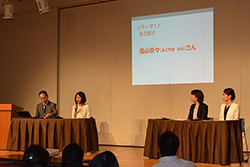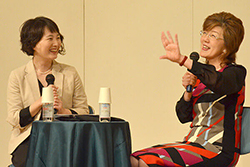PTNA Piano Teachers' Seminar Vol.50 - The 2nd & 3rd Part
2017/05/25 | コメント(0)
| トラックバック(0)
|
Here are the reports of PTNA Piano Teachers' Seminar Vol.50, part 2 & 3.
 The 2nd part was a lecture and a panel discussion about the possibilities of music colleges. Takao Ouchi, the author of several books about music colleges, was invited as a lecturer. Despite that he was not a graduate of a music college, he is currently working for a music college (Musashino Academy of Music) and discovers a number of advantages and merits that music colleges and graduates have. Here are what he pointed out. For instance, communication skills, time management skills, polite manners, competitiveness, broad perspective, self-control ability, patience, diligence, good memory retention, etc. are the strengths that many of the music students acquire through music learning. They also have historic understanding, insights, logicality, sincerity to have dialogues with composers by reading scores. Furthermore, music is the world where men and women stand on a same stage, so they have a sense of diversity.
The 2nd part was a lecture and a panel discussion about the possibilities of music colleges. Takao Ouchi, the author of several books about music colleges, was invited as a lecturer. Despite that he was not a graduate of a music college, he is currently working for a music college (Musashino Academy of Music) and discovers a number of advantages and merits that music colleges and graduates have. Here are what he pointed out. For instance, communication skills, time management skills, polite manners, competitiveness, broad perspective, self-control ability, patience, diligence, good memory retention, etc. are the strengths that many of the music students acquire through music learning. They also have historic understanding, insights, logicality, sincerity to have dialogues with composers by reading scores. Furthermore, music is the world where men and women stand on a same stage, so they have a sense of diversity. After he started working at Musashino, the rate of employment for companies has reached 30%, a two-fold increase from previous years. Ouchi also encourages piano teachers, and teachers them how to manage private music studios successfully through a book published last April. Ouchi believes that a successful development of individual studios will lead to a healthy development of music field, and eventually bring a positive change in the music education in Japan. "To recognize one's own strength is the first step" said Ouchi.
Three music college graduates appeared in the following panel discussion (Nana Fukuyama Chieri Tomita, Ayumi Iguchi). They pointed out that self-discipline, patience, accuracy, teaching skills, communication skills, etc. are the strengths that music college students have. However, they also admitted that they should have studied management skills, basic PC skills, or pedagogy for professional teachers, etc. before graduation. They reached a conclusion that one of the most important things is to find what they would like to do with piano in the future, and start to do something accordingly.
 The 3rd part was a dialogue with Kei Ito, a renowned pianist and professor of Tokyo University of Fine Arts and Music, Toho Gakuen School of Music (interviewer : Arisa Iida, music writer). When she was a child, her parents loved piano and encouraged her to study. Her parents always taught her the importance of taking "a proper process", and never blamed her for results. She met with Prof. Hans Leygraf when she was a high school student, and studied with him in Salzburg later. He taught her the importance of "one note", and always sought for the essence of music. Ito described Prof.Leygraf as "a world heritage that a few people visit", whereas Alfred Brendel, one of her most favorite pianists, as "a world heritage that everyone visits". Anyway, she was inspired by professor's sincere attitude toward music, and that provided firm foundation to her music making. Today, as a teacher herself, she always keeps in mind that she faces with music as well as individual students sincerely.
The 3rd part was a dialogue with Kei Ito, a renowned pianist and professor of Tokyo University of Fine Arts and Music, Toho Gakuen School of Music (interviewer : Arisa Iida, music writer). When she was a child, her parents loved piano and encouraged her to study. Her parents always taught her the importance of taking "a proper process", and never blamed her for results. She met with Prof. Hans Leygraf when she was a high school student, and studied with him in Salzburg later. He taught her the importance of "one note", and always sought for the essence of music. Ito described Prof.Leygraf as "a world heritage that a few people visit", whereas Alfred Brendel, one of her most favorite pianists, as "a world heritage that everyone visits". Anyway, she was inspired by professor's sincere attitude toward music, and that provided firm foundation to her music making. Today, as a teacher herself, she always keeps in mind that she faces with music as well as individual students sincerely.***
The Teaching Demonstration Sessions by 17 piano teachers were held on the same day, from the elementary level (10 min), the intermediate level (12 min), to the advanced level (15 min). And in the previous evening, Shohei Sekimoto, a pianist and a 4th prize winner of 2005 Chopin International Piano Competition in Warsaw, gave a talk concert and performed several repertoires from PTNA Piano Competition 2017. During the two days, each session was full of enthusiastic audience.
【GoogleAdsense】